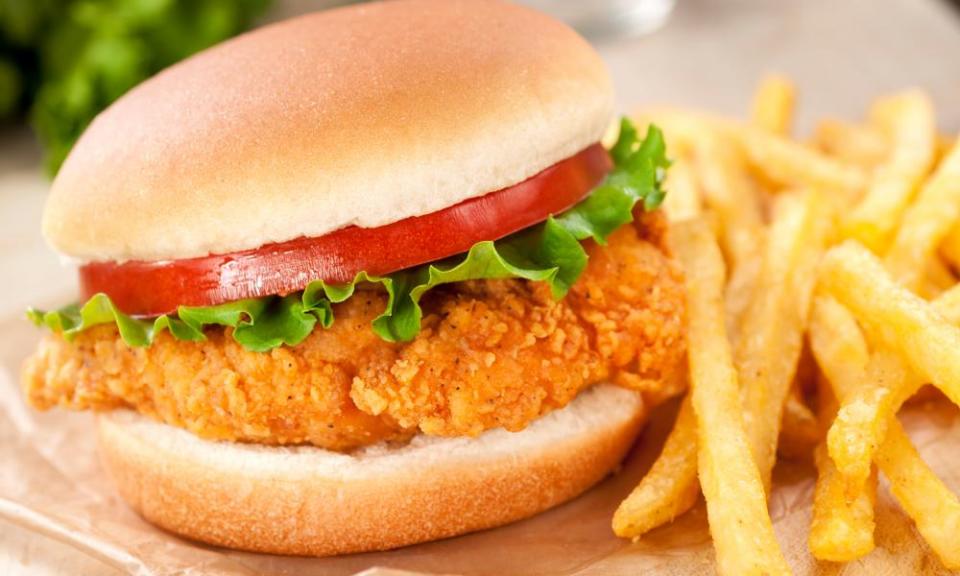Fried chicken, chips and global warming

Some of the last week’s news items paint a grim portrait of our world: a final warning about climate change (Global warming must not exceed 1.5C, landmark UN report warns, 8 October) and our meat consumption (Huge cut in meat eating vital to curb global warming, 11 October). In the meantime, large parts of our country are as malnourished as ever in spite of the glut (UK’s ‘food deserts’, 12 October).
I live in an area served by numerous convenience stores and fried chicken, pizza and kebab shops. There is a strong community of independent grocers stocking a wide range of fresh produce and all the exotic ingredients that home cooks could want. And we have a fiercely independent scene of local traders who sell their crafts at regular inner-city markets too.
What is striking is the sheer amount of food on offer. Everywhere we go, we are presented with opportunities to eat. It is something to be celebrated when people have enough food and we can take the time to enjoy what we love to eat. But the quantities in which we consume are not sustainable. To save the planet, we should be curbing our gluttony.
Jennifer Toal
Sheffield
• Citing new research from the journal Nature, Damian Carrington notes what many have been saying for decades: that meat production is heating up our climate. However, if it will take people choosing rice and chickpeas over a sizzling steak to avoid a catastrophe, we had better start preparing for the worst. Global per-capita meat consumption is at an all-time high and heading higher.
Luckily, the choice isn’t beans or beef. Thanks to innovative companies, we can efficiently and sustainably produce the meat that people want. These companies are reproducing the composition of conventional meat – amino acids, fats, minerals – with the same elements from plants. These plant-based meats are quickly becoming popular across Europe and the United States. Our ability to produce clean meat – grown directly from cells in a clean facility, with no abattoir required – is also rapidly approaching commercial scale. We are fortunate that we now have a realistic chance of avoiding climate catastrophe.
Bruce Friedrich
Executive director, The Good Food Institute, Washington DC
• On Friday morning, I baked my usual loaf of bread, using white and wholemeal flour. The best-by dates on the bags are December 2018 and March 2019, so it’s clear that flour I use could be at least six months old. Would Felicity Lawrence (Why do we let ourselves be conned about our food?, 12 October) regard my bread as freshly baked? I can’t see that there is much difference between my “freshly baked” bread and Pret a Manger’s and would be prepared to bet that few people would be able to tell the difference between mine and the part-baked bread made by the French company and finished off in a Pret a Manger shop.
Ken Vines
Horrabridge, Devon
• Felicity Lawrence is right when she describes why we make our poor food choices: haste and price among them. There are two further pertinent issues.
First is the need for the reintroduction of what used to be called domestic science in secondary schools, to give the next generation the skills they need to not be conned by clever advertising and poor labelling of low-quality food products.
The second is the need for people with severe allergies to carefully plan travel, avoiding the need to buy from the end of long, unreliable manufacturing lines, and stick to simple trusted food. Old fashioned though it might seem, a well-stocked sandwich box and flask would help.
Dr Colin Bannon
Crapstone, Devon
• Following on from your front-page article and your extensive coverage of the latest IPCC report, perhaps the Guardian could take a lead and only publish meat-free recipes in future.
Bob Summers
Oxford
• It was very exciting to read Bee Wilson’s article in the Guardian (Food is a great source of pleasure. Forget that, and we’re doomed to eat badly, 15 October).” As a newlywed I thought having to cook every day was akin to a “life sentence” until I learned about the benefits of a vegan diet and a whole new world of taste sensations opened up, without having to use animal products. The internet has a huge array of easy, inexpensive vegan recipes from Indian, to Chinese, Mexican, and Italian, and the list of delights goes on. I went on to teach vegan cooking and had fun showing people how to live healthily without harming any living being.
Diane Cornelius
Adelaide, Australia
• Join the debate – email guardian.letters@theguardian.com
• Read more Guardian letters – click here to visit gu.com/letters
• Do you have a photo you’d like to share with Guardian readers? Click here to upload it and we’ll publish the best submissions in the letters spread of our print edition

 Yahoo News
Yahoo News 